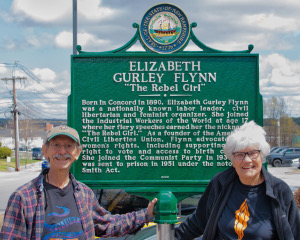By Arnie Alpert
I don’t consider myself a contentious person. I like it when people get along and find ways to work out their differences. Even when engaged in political protest, I generally follow the rules, at least when I think they are fair. And when I contest public or private policies with which I disagree, I do so openly.
That’s what Mary Lee Sargent and I did Monday when we filed suit in Merrimack County Superior Court to call for the state to reverse its illegal removal of the Elizabeth Gurley Flynn historical marker.
To recap the story, in 2022 the NH Division of Historical Resources (DHR) gave its approval to our proposal to install a historical marker near the place in Concord where Elizabeth Gurley Flynn was born on August 7, 1890. In order to meet their approval, Mary Lee and I had demonstrated public support through a petition, provided a suggested text for the marker with footnotes to document each fact, and made a case that the subject was historically significant.
Showing Flynn’s significance was easy. She was in the news from the age of 14, when she won an essay contest, until her death, which merited a front-page article in the New York Times. In between, she led strikes, defended political prisoners (and was one, herself), and spoke up for the rights of women and African Americans. She is the subject of two scholarly biographies, the inspiration behind several songs, and a character in a recent historical novel. As Flynn biographer Lara Vapnek has said, “She was arguably the most significant woman on the radical left in the twentieth century United States.”
She was also a Communist Party member from the age of 46 until her death at age 64. That’s what aroused the ire of Executive Councilor Joe Kenney, who missed the memo stating that the purpose of the historical marker program “is to educate the public about New Hampshire’s history, not to honor, memorialize, or commemorate persons, events, or places.” Nevertheless, following Kenney’s outburst at the May 3 Council meeting, the DHR changed its rules for the historical marker program, giving more authority to the Commissioner of the Department of Natural and Cultural Resources. The Commissioner, Sarah Stewart, then ordered the marker taken down, just two weeks after it had been unveiled by her staff. According to the Concord Monitor, Stewart said the marker was removed in consultation with the governor.
The DHR website now lists the Flynn marker (Historical Marker #278) as “retired.” The news release they issued on May 2, announcing its dedication, has disappeared. According to a letter Mary Lee and I received from Commissioner Stewart, “the marker was properly removed.” We disagree.
While the revised rules gave more authority to the Commissioner, they clearly stated that any decision to “retire” historical markers must be based on a recommendation from the DHR staff followed by review by the State Historical Resources Council. No such recommendation or review has taken place.
The rules say markers can be retired if they are in a state of disrepair, certainly not an issue for one which was only two weeks old. Other conditions which could prompt retirement are errors of fact or a lack of historical context, neither of which have been alleged in the case of the Flynn marker. The DHR policy also states that retired markers should be replaced by new ones addressing the same topic. That does not seem to be on Commissioner Stewart’s agenda, nor that of Governor Sununu and Councilor Kenney.
Nowhere in the policies does it say markers may be removed based on ideology or political whims of government officials.
Having noted that the state ignored its own rules, even after amending them in an attempt to legitimize the Flynn marker’s removal, our legal complaint goes on to state that even the ignored rules are invalid for two reasons. First, they were never submitted to the formal process for adopting administrative rules (RSA 541-A). Second, DNCR never brought proposed rules to the Historical Resources Council, as they are required to do under another statute (RSA 227-C:5).
If the rules are invalid, that means the legally guiding principle for the marker program is the statute (RSA 236:40) which says, “The commissioner of transportation … shall put up a marker upon the petition of 20 or more state citizens.” For the record, our petition was signed by 40 people. We would have collected more, but the DHR staff told us it was unnecessary.
Ironically, the state’s misguided decision to remove the Flynn marker has aroused far more interest in Elizabeth Gurley Flynn than would have been the case had they left it alone. Replicas of the disappeared marker are appearing on lawns around Concord. The NH Humanities Council recently held a webinar with Flynn biographer Lara Vapnek. Stories about the marker’s removal have been published not only in the local media but in the Boston Globe, New York Times, and Washington Post. In other words, the Rebel Girl is now alive in the historical memory of New Hampshire residents, achieving the purpose of the marker program.
Irony, however, is not a principle held in high regard by the law. Mary Lee and I believe the law is clear that the Flynn marker never should have been removed. Having been removed, we believe the Court should order the state to return it to its place behind the courthouse, around the corner from where Elizabeth Gurley Flynn’s historically significant life began.
Disclaimer: Andru Volinsky, who is representing Arnie Alpert and Mary Lee Sargent in the Flynn marker case, also represents the Center for Public Interest Journalism, publisher of InDepthNH.org
Arnie Alpert spent decades as a community organizer/educator in NH movements for social justice and peace. Officially retired since 2020, he keeps his hands (and feet) in the activist world while writing about past and present social movements. He writes the “Active with the Activists” column for InDepthNH.org/






